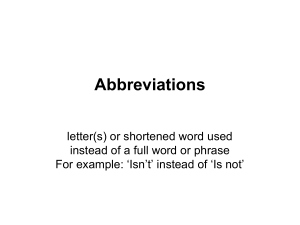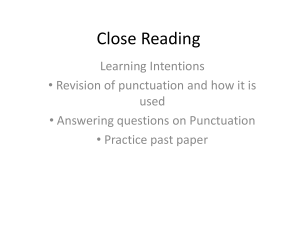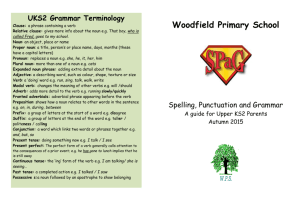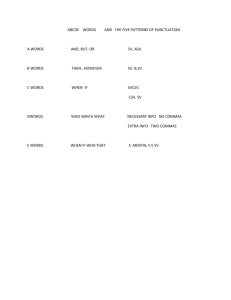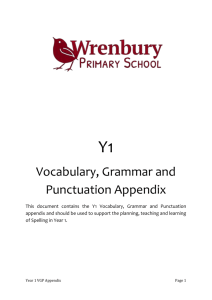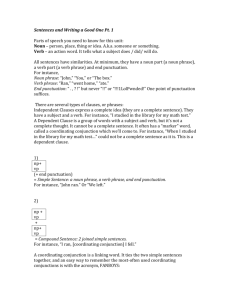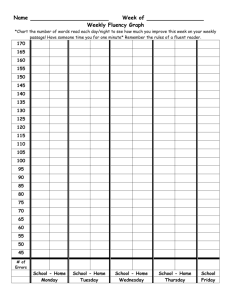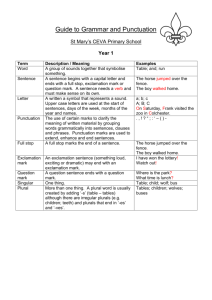Literary Terminology
advertisement
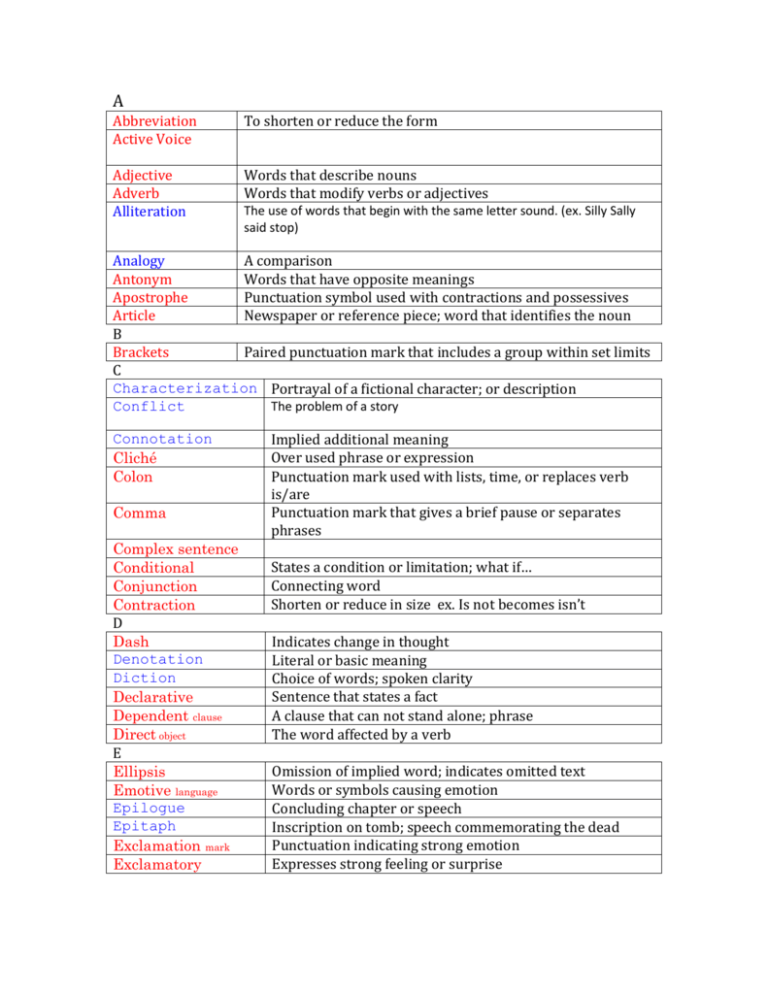
A Abbreviation Active Voice To shorten or reduce the form Adjective Adverb Alliteration Words that describe nouns Words that modify verbs or adjectives The use of words that begin with the same letter sound. (ex. Silly Sally said stop) Analogy A comparison Antonym Words that have opposite meanings Apostrophe Punctuation symbol used with contractions and possessives Article Newspaper or reference piece; word that identifies the noun B Brackets Paired punctuation mark that includes a group within set limits C Characterization Portrayal of a fictional character; or description Conflict The problem of a story Connotation Cliché Colon Comma Complex sentence Conditional Conjunction Contraction D Dash Denotation Diction Declarative Dependent clause Direct object E Ellipsis Emotive language Epilogue Epitaph Exclamation mark Exclamatory Implied additional meaning Over used phrase or expression Punctuation mark used with lists, time, or replaces verb is/are Punctuation mark that gives a brief pause or separates phrases States a condition or limitation; what if… Connecting word Shorten or reduce in size ex. Is not becomes isn’t Indicates change in thought Literal or basic meaning Choice of words; spoken clarity Sentence that states a fact A clause that can not stand alone; phrase The word affected by a verb Omission of implied word; indicates omitted text Words or symbols causing emotion Concluding chapter or speech Inscription on tomb; speech commemorating the dead Punctuation indicating strong emotion Expresses strong feeling or surprise F Figurative Figure of speech First person Flashback Foreshadowing G Gerund (phrase) H Hyperbole Hyphen I Idiom Imagery Imperative Independent clause Indirect object Infinitive Interjection Interrogative Irony L Literal M Metaphor Modifier Mood N Noun O Onomatopoeia P Paragraph Parentheses Participle (phrase) Parts of speech Passive Personification Phrase Plot Not literal; symbolic Nonliteral expression or use of language the person telling the story is a character inside the story. (Uses pronouns such as I, me, my, we and us.) To remember something from a previous time Clues or hints of things to come A verb acting as a noun and ending in -ing An extreme exaggeration Punctuation used to divide words, fractions, titles, or compound adjectives An expression with nonliteral meaning; stylistic Metaphors and similes; mental images Sentence that gives a command or request A sentence that can stand alone Person or thing action is done to Basic form of the verb Comment made abruptly; can be emotional A question Humor based on opposites or contradictions Basic meaning; word for word A comparison without using like or as Word qualifying another General feeling A person, place, thing, concept, or idea Sound words Section of writing Punctuation marks used to show a departure from the topic Verb acting as an adjective Words with same function in sentences ex. Nouns, verbs… Not taking an active role Giving human qualities to something nonhuman An expression The sequence of events in a story Plural Point of View Possessive Predicate Prefix Preposition (phrase) Prologue Pronoun Proper noun Prose Punctuation Puns Q Quotation R Root Rhyme scheme Run-on S Second person Semicolon Sentence Setting Simile Stanza Structure Subject Suffix Superlative Suspense Syllable Symbol Synonym T Tense Theme Third person Tone V Verb Verbal More than one Perspective Showing ownership Part of sentence with the verb Beginning part of word Words used to show spatial or time orientation introduction Words that replace or rename a noun Specific names Language that is not poetry Marks to organize writing Play on words Quoting someone else’s words Base or original part of a word Pattern of rhyme Sentence without proper punctuation break Instructional writing (uses you, your) Punctuation used to combine sentences or separate a series A complete thought Time, place, mood, background information of a story A comparison using like or as A paragraph for poetry The way text is organized Topic or course of study Element added at the end of the word Highest degree of comparison Enjoyable tension or uncertainty Unit of spoken language Something that represents something else Words with similar meaning Forms of verbs that express time The moral or lesson you can learn from a text that is a truism Perspective of a narrator; either limited or omniscient (uses he, she, they) The author’s feelings about the issue Action word or state of being Words formed from verbs (gerunds, participles) Voice Expressed opinion

